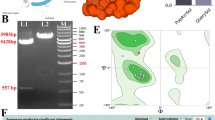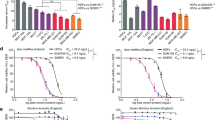Abstract
Melittin, a major peptide constituent of bee venom, exhibits potential anticancer effects against various types of cancers, including breast cancer. We determined the radiosensitizing effects of melittin on breast cancer both in vitro and in vivo models. Viability of murine (4T1) and human (MCF-7) breast cancer cell lines treated with melittin was measured by MTT assay. The radiosensitizing effects of melittin were investigated using a clonogenic assay. The expression of apoptosis-related proteins was assessed by Western blotting. Tumor growth with/without melittin treatment was investigated in a 4T1 xenograft breast cancer mouse model. Melittin-mediated radiosensitivity was evaluated by assessing growth inhibitory activity based on the change in tumor volume and the time taken for a five-fold increase in the relative tumor volume (RTV5). Melittin inhibited the viability of 4T1 and MCF-7 breast cancer cells with IC50 of 1.70 and 1.51 μM, respectively. Melittin decreased clonogenicity with a sensitization enhancement ratio of 1.09–1.32. Melittin plus irradiation significantly increased the Bax/Bcl-2 ratio. In vivo, intraperitoneal injection of melittin significantly reduced tumor growth in 4T1 tumor-bearing mice. Melittin plus irradiation treatment increased the tumor growth inhibition rate (87.97%) as compared with the control group and had the greatest effect on tumor growth inhibition with the longest RTV5 of 37.0 days. Irradiation alone, melittin alone, and control treatment showed RTV5 of 24.4, 16.2, and 13.6 days, respectively. By inducing apoptosis, melittin serves as a promising radiosensitizer for breast cancer radiotherapy, providing a valuable strategy to improve the efficacy of radiation therapy.



Similar content being viewed by others
Data Availability
All data obtained during the current study are available from the corresponding author upon reasonable request.
References
Balin-Gauthier D, Delord JP, Rochaix P, Mallard V, Thomas F, Hennebelle I, Bugat R, Canal P, Allal C (2006) In vivo and in vitro antitumor activity of oxaliplatin in combination with cetuximab in human colorectal tumor cell lines expressing different level of EGFR. Cancer Chemother Pharmacol 57:709–718. https://doi.org/10.1007/s00280-005-0123-3
Baskar R, Dai J, Wenlong N, Yeo R, Yeoh KW (2014) Biological response of cancer cells to radiation treatment. Front Mol Biosci 1:24. https://doi.org/10.3389/fmolb.2014.00024
Bray F, Ferlay J, Soerjomataram I, Siegel RL, Torre LA, Jemal A (2018) Global cancer statistics 2018: GLOBOCAN estimates of incidence and mortality worldwide for 36 cancers in 185 countries. CA Cancer J Clin 68:394–424. https://doi.org/10.3322/caac.21492
Daniluk K, Kutwin M, Grodzik M, Wierzbicki M, Strojny B, Szczepaniak J, Balaban J, Sosnowska M, Chwalibog A, Sawosz E, Jaworski S (2020) Use of selected carbon nanoparticles as melittin carriers for MCF-7 and MDA-MB-231 human breast cancer cells. Materials 13:90. https://doi.org/10.3390/ma13010090
DeGrado W, Musso G, Lieber M, Kaiser E, Kezdy F (1982) Kinetics and mechanism of hemolysis induced by melittin and by a synthetic melittin analogue. Biophys J 37:329–338
Fidelio GD, Maggio B, Cumar FA (1984) Interaction of myelin basic protein, melittin and bovine serum albumin with gangliosides, sulphatide and neutral glycosphingolipids in mixed monolayers. Chem Phys Lipids 35:231–245. https://doi.org/10.1016/0009-3084(84)90049-5
Gao D, Zhang J, Bai L, Li F, Dong Y, Li Q (2018) Melittin induces NSCLC apoptosis via inhibition of miR-183. Onco Targets Ther 11:4511–4523. https://doi.org/10.2147/OTT.S169806
Hacker G (2000) The morphology of apoptosis. Cell Tissue Res 301:5–17. https://doi.org/10.1007/s004410000193
Hider RC (1988) Honeybee venom: a rich source of pharmacologically active peptides. Endeavour 12:60–65. https://doi.org/10.1016/0160-9327(88)90082-8
Jeong YJ, Choi Y, Shin JM, Cho HJ, Kang JH, Park KK, Choe JY, Bae YS, Han SM, Kim CH, Chang HW, Chang YC (2014) Melittin suppresses EGF-induced cell motility and invasion by inhibiting PI3K/Akt/mTOR signaling pathway in breast cancer cells. Food Chem Toxicol 68:218–225. https://doi.org/10.1016/j.fct.2014.03.022
Jo M, Park MH, Kollipara PS, An BJ, Song HS, Han SB, Kim JH, Song MJ, Hong JT (2012) Anti-cancer effect of bee venom toxin and melittin in ovarian cancer cells through induction of death receptors and inhibition of JAK2/STAT3 pathway. Toxicol Appl Pharmacol 258:72–81. https://doi.org/10.1016/j.taap.2011.10.009
Kim JJ, Tannock IF (2005) Repopulation of cancer cells during therapy: an important cause of treatment failure. Nat Rev Cancer 5:516–525. https://doi.org/10.1038/nrc1650
Kong G-M, Tao W-H, Diao Y-L, Fang P-H, Wang J-J, Bo P, Qian F (2016) Melittin induces human gastric cancer cell apoptosis via activation of mitochondrial pathway. World J Gastroenterol 22(11):3186–3195. https://doi.org/10.3748/wjg.v22.i11.3186
Lee SH, Kim JY, Lee KC, Nam JS, Choi J, Lee SH, Sung KH, Ahn SH (2014) Establishment of linear accelerator-based image guided radiotherapy for orthotopic 4T1 mouse mammary tumor model. Lab Anim Res 30:64–72. https://doi.org/10.5625/lar.2014.30.2.64
Lim HN, Baek SB, Jung HJ (2019) Bee venom and its peptide component melittin suppress growth and migration of melanoma cells via inhibition of PI3K/AKT/mTOR and MAPK pathways. Molecules 24:929. https://doi.org/10.3390/molecules24050929
Mayahi S, Neshasteh-Riz A, Pornour M, Eynali S, Montazerabadi A (2020) Investigation of combined photodynamic and radiotherapy effects of gallium phthalocyanine chloride on MCF-7 breast cancer cells. J Biol Inorg Chem 25:39–48. https://doi.org/10.1007/s00775-019-01730-w
Minafra L, Porcino N, Bravata V, Gaglio D, Bonanomi M, Amore E, Cammarata FP, Russo G, Militello C, Savoca G, Baglio M, Abbate B, Iacoviello G, Evangelista G, Gilardi MC, Bondi ML, Forte GI (2019) Radiosensitizing effect of curcumin-loaded lipid nanoparticles in breast cancer cells. Sci Rep 9:11134. https://doi.org/10.1038/s41598-019-47553-2
Park HJ, Lee HJ, Choi MS, Son DJ, Song HS, Song MJ, Lee JM, Han SB, Kim Y, Hong JT (2008) JNK pathway is involved in the inhibition of inflammatory target gene expression and NF-kappaB activation by melittin. J Inflamm 5:1–13. https://doi.org/10.1186/1476-9255-5-7
Qi JX, Chen YH, Xue TT, Lin Y, Huang SY, Cao SY, Wang XN, Su Y, Lin ZK (2020) Graphene oxide-based magnetic nanocomposites for the delivery of melittin to cervical cancer HeLa cells. Nanotechnology 31:065102. https://doi.org/10.1088/1361-6528/ab5084
Rady I, Siddiqui IA, Rady M, Mukhtar H (2017) Melittin, a major peptide component of bee venom, and its conjugates in cancer therapy. Cancer Lett 402:16–31. https://doi.org/10.1016/j.canlet.2017.05.010
Raghuraman H, Chattopadhyay A (2007) Melittin: a membrane-active peptide with diverse functions. Biosci Rep 27:189–223. https://doi.org/10.1007/s10540-006-9030-z
Socarras KM, Theophilus PAS, Torres JP, Gupta K, Sapi E (2017) Antimicrobial activity of bee venom and melittin against Borrelia burgdorferi. Antibiotics 6:31. https://doi.org/10.3390/antibiotics6040031
Soliman C, Eastwood S, Truong VK, Ramsland PA, Elbourne A (2019) The membrane effects of melittin on gastric and colorectal cancer. PLoS ONE 14:e0224028. https://doi.org/10.1371/journal.pone.0224028
Tinoco G, Warsch S, Gluck S, Avancha K, Montero AJ (2013) Treating breast cancer in the 21st century: emerging biological therapies. J Cancer 4:117–132. https://doi.org/10.7150/jca.4925
Wang C, Chen TY, Zhang N, Yang MJ, Li B, Lu X, Cao XT, Ling CQ (2009) Melittin, a major component of bee venom, sensitizes human hepatocellular carcinoma cells to tumor necrosis factor-related apoptosis-inducing ligand (TRAIL)-induced apoptosis by activating CaMKII-TAK1-JNK/p38 and inhibiting I kappa B alpha kinase-NF kappa B. J Biol Chem 284:3804–3813. https://doi.org/10.1074/jbc.M807191200
Yang X, Zhu H, Ge Y, Liu J, Cai J, Qin Q, Zhan L, Zhang C, Xu L, Liu Z, Yang Y, Yang Y, Ma J, Cheng H, Sun X (2014) Melittin enhances radiosensitivity of hypoxic head and neck squamous cell carcinoma by suppressing HIF-1alpha. Tumour Biol 35:10443–10448. https://doi.org/10.1007/s13277-014-2218-0
Zarrinnahad H, Mahmoodzadeh A, Hamidi MP, Mahdavi M, Moradi A, Bagheri KP, Shahbazzadeh D (2018) Apoptotic effect of melittin purified from iranian honey bee venom on human cervical cancer hela cell line. Int J Pept Res Ther 24:563–570. https://doi.org/10.1007/s10989-017-9641-1
Zhang SF, Chen Z (2017) Melittin exerts an antitumor effect on non-small cell lung cancer cells. Mol Med Rep 16:3581–3586. https://doi.org/10.3892/mmr.2017.6970
Zhu H, Yang X, Liu J, Ge Y, Qin Q, Lu J, Zhan L, Liu Z, Zhang H, Chen X, Zhang C, Xu L, Cheng H, Sun X (2014) Melittin radiosensitizes esophageal squamous cell carcinoma with induction of apoptosis in vitro and in vivo. Tumour Biol 35:8699–8705. https://doi.org/10.1007/s13277-014-2146-z
Acknowledgements
This work was supported by the Gachon University Gil Medical Center (Grant No. 2013-42) and a National Research Foundation of Korea (NRF) grant funded by the Korean government (MSIT) (Grant No. NRF-2020R1F1A1072266). We would like to thank Editage (www.editage.co.kr) for English language editing.
Funding
This work was supported by the Gachon University Gil Medical Center (Grant No. 2013-42) and a National Research Foundation of Korea (NRF) grant funded by the Korean government (MSIT) (Grant No. NRF-2020R1F1A1072266).
Author information
Authors and Affiliations
Corresponding author
Ethics declarations
Conflict of interest
The authors declare that they have no conflict of interest.
Informed Consent
The article does not contain any studies in patients by any of the authors.
Ethical Approval
Institutional and national guidelines for the care and use of mice and all experimental procedures involving mice were approved by the Institutional Animal Care and Use Committee.
Additional information
Publisher's Note
Springer Nature remains neutral with regard to jurisdictional claims in published maps and institutional affiliations.
Supplementary Information
Below is the link to the electronic supplementary material.
Rights and permissions
About this article
Cite this article
Chang, SN., Kim, SH., Kim, H.J. et al. In Vitro and In Vivo Investigation of the Radiation-Sensitizing Effects of Melittin in Breast Cancer Cells. Int J Pept Res Ther 28, 8 (2022). https://doi.org/10.1007/s10989-021-10313-w
Accepted:
Published:
DOI: https://doi.org/10.1007/s10989-021-10313-w




